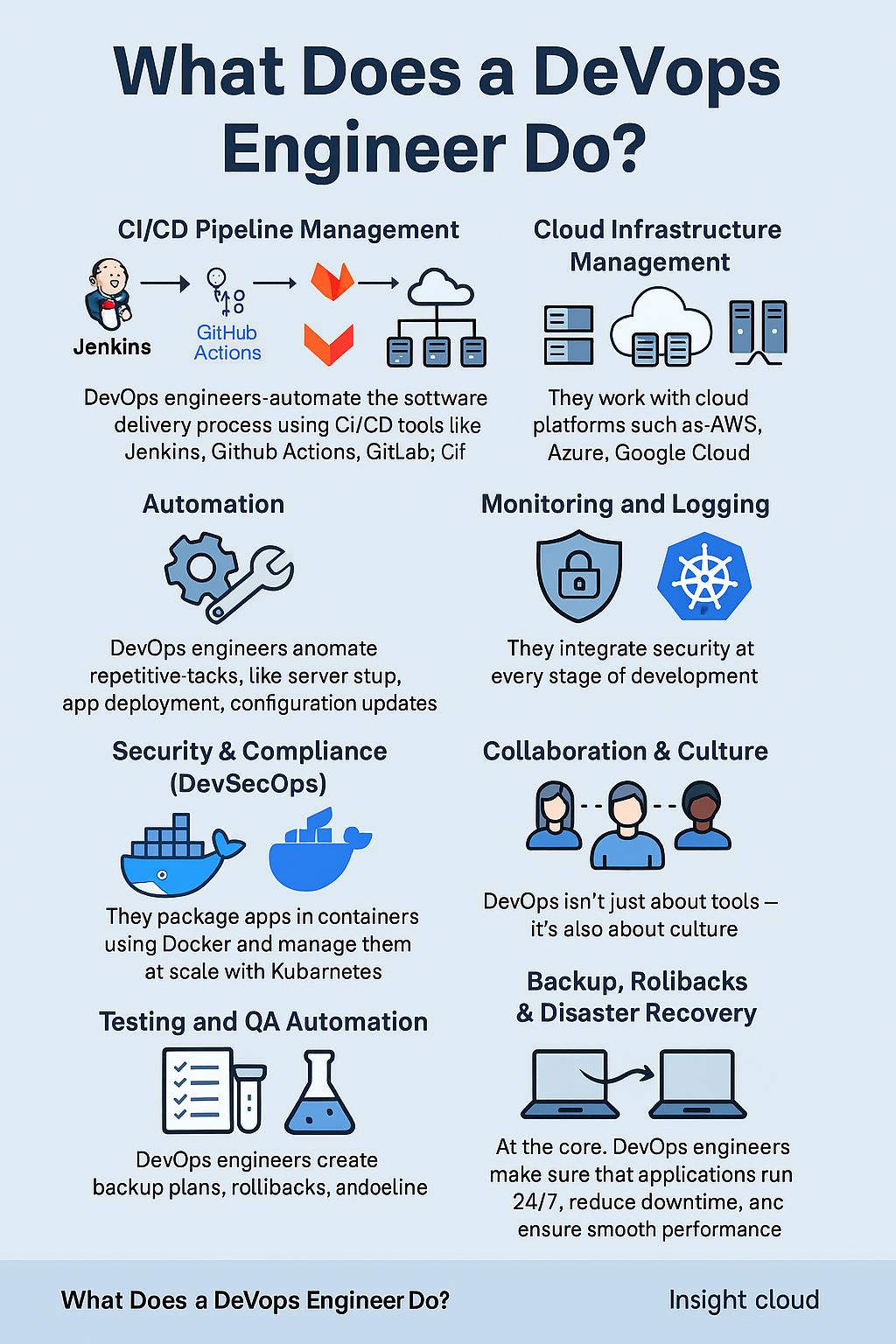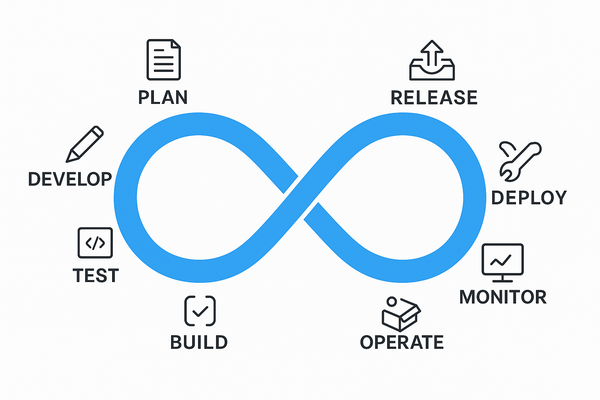In today’s fast-moving tech world, businesses need to deliver software faster, safer, and more reliably than ever before. That’s where a DevOps Engineer comes in. But what exactly do DevOps engineers do, and why are they in such high demand?
This blog will break down the roles, tools, and responsibilities of a DevOps engineer in simple language, while also giving you expert insights into why this is a top career choice.

Who Is a DevOps Engineer?
A DevOps engineer is a professional who combines software development (Dev) and IT operations (Ops) skills to automate, streamline, and improve the software delivery process.
They bridge the gap between developers and system administrators to ensure:
- Faster deployments
- Higher reliability
- Continuous delivery of software
Key Responsibilities of a DevOps Engineer
1. CI/CD Pipeline Management
DevOps engineers build and manage CI/CD pipelines (Continuous Integration and Continuous Deployment). These pipelines automatically test, build, and deploy code with tools such as:
- Jenkins
- GitHub Actions
- GitLab CI/CD
- CircleCI
Why it matters: Code gets from developers to production faster, with fewer bugs.
2. Cloud Infrastructure Management
Most DevOps engineers manage cloud platforms like:
- Amazon Web Services (AWS)
- Microsoft Azure
- Google Cloud Platform (GCP)
They handle tasks like:
- Setting up servers
- Configuring databases
- Managing networking
- Scaling infrastructure automatically using Infrastructure as Code (IaC) tools like Terraform or CloudFormation
3. Automation of Repetitive Tasks
A big part of DevOps is automation. DevOps engineers automate things like:
- App deployments
- Server setup
- Configuration updates
Tools used:
- Ansible
- Puppet
- Chef
- Bash/Python scripting
4. Monitoring and Logging
Keeping an eye on systems is vital. DevOps engineers use monitoring and logging tools to:
- Detect errors early
- Ensure performance
- Trigger alerts if systems go down
Popular tools:
- Prometheus
- Grafana
- ELK Stack (Elasticsearch, Logstash, Kibana)
- Datadog
5. Security Integration (DevSecOps)
Modern DevOps includes security from the beginning — this is called DevSecOps.
Security practices include:
- Vulnerability scanning
- Secrets management
- Setting role-based access controls
Popular tools:
- Snyk
- Trivy
- HashiCorp Vault
6. Containerization & Orchestration
DevOps engineers use containers to bundle applications with everything they need to run anywhere.
Key tools:
- Docker (for containers)
- Kubernetes (for managing and scaling containers)
- Helm (for managing Kubernetes apps)
7. Collaboration Between Teams
DevOps is not just a job — it’s a culture. DevOps engineers:
- Promote communication between dev and ops
- Encourage transparency
- Reduce silos
This leads to quicker releases and higher-quality software.
8. Testing and Quality Assurance
DevOps engineers set up automated tests to catch bugs early in the software lifecycle.
Test types:
- Unit tests
- Integration tests
- Load tests
Tools used:
- Selenium
- JUnit
- Postman
9. Backup and Disaster Recovery
To prevent data loss, DevOps engineers create:
- Backup systems
- Rollback strategies
- Disaster recovery plans
10. Keep Everything Running Smoothly
Ultimately, a DevOps engineer ensures that:
- Applications run 24/7
- Issues are fixed quickly
- Releases happen safely
They’re like the behind-the-scenes superheroes of tech.
Why Companies Need DevOps Engineers
- Faster time to market
- Fewer bugs in production
- Lower development costs
- Better product stability and scalability
- Happier customers and teams
📈 Top Skills of a Successful DevOps Engineer
| Skill | Tools & Technologies |
|---|---|
| Version Control | Git, GitHub, GitLab |
| CI/CD | Jenkins, GitHub Actions |
| Cloud | AWS, Azure, GCP |
| Containers | Docker, Kubernetes |
| Automation | Ansible, Terraform |
| Monitoring | Prometheus, Grafana |
| Scripting | Bash, Python |
Final Thoughts
A DevOps engineer is essential in the modern software development lifecycle. They don’t just write code or manage servers — they enable businesses to scale, innovate, and deliver faster.
If you’re considering a career in tech, becoming a DevOps engineer is a smart, high-impact choice.
Keywords for This Blog:
- What does a DevOps engineer do
- DevOps responsibilities
- DevOps tools and technologies
- DevOps job description
- Cloud and DevOps career
- CI/CD pipelines explained
- DevOps engineer in demand
Next Steps
- Follow our DevOps tutorials
- Explore more DevOps engineer career guides
- Subscribe to InsightClouds for weekly updates
- Subscribe our DevOps youtube channel
